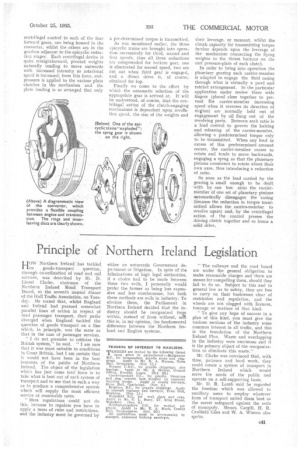Principle of Northern Ireland Legislation
Page 83

If you've noticed an error in this article please click here to report it so we can fix it.
HOW Northern Ireland' has tackled
its goods-transport question, through co-ordination of road and rail services, was described by Mr. D. Lionel Clarke, chairman of the Northern Ireland Road Transport Board, at the seventh annual dinner of the Hull Traffic Association, on Tuesday. He stated that, whilst England and Ireland had pursued somewhat parallel lines of action in respect of road passenger transport, their paths diverged when England tackled the question of goods transport on a line which, in principle, was the same as that in the case of passenger services.
" I do not presume to criticize the British system," he said. " I am sure that it was most suitable to conditions in Great Britain, but I am certain that it would not have been in the best interests of the public of Northern Ireland, The object of the legislation which has just come into force is to take what is best out of each system of transport and to tsse that in such a way as to produce a comprehensive system which will supply the most efficient service at reasonable rates.
" Mere regulations could not do this, because to regulate you have to apply a mass of rules and restrictions, and the industry must be governed by
either an autocratic Government department or litigation. In spite of the fulminations of high legal authorities, if a choice had to be made between these two evils, I personally would prefer the former as being less expensive and less cumbersome, but both these methods are evils in industry. To obviate them, the Parliament in Northern Ireland decided that the industry should be reorganized from within, instead of from without, an% this is, in my opinion, the fundamental difference between the Northern Ireland and English systems,
" The railways and the road board are under the general obligation to make reasonable charges and there are means for compelling them, should they fail to do so. Subject to this and to general law as to safety, they are free to carry on their businesses clear of restriction and regulation, and the wheels are not clogged with licences, tonnage or matters of that kind.
" To give any hope of success in a plan of this kind, you must give the various sections of the industry some common interest in all traffic, and this is the foundation of the Northern Ireland Plan. Waste and overlapping in the industry were enormous and it is the primary object of the reorganization to eliminate this waste."
Mr. Clarke was convinced that, with time, patience and hard work, they could create a system of transport in Northern Ireland which would serve the needs of the public and operate on a self-supporting basis,
Mr. D. R. Lamb said he regarded the freedom which was allowed to ancillary users to employ whatever form of transport suited them best as the surest safeguard against the evils of monopoly. Messrs. Cargill, H. R. Caulfield Giles and W. A. Winson also
















































































































































